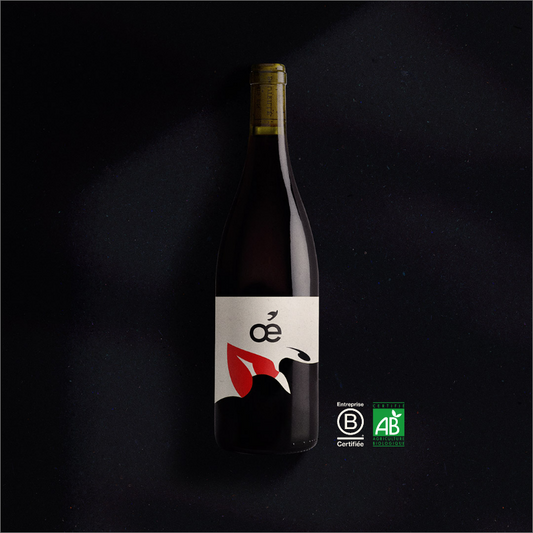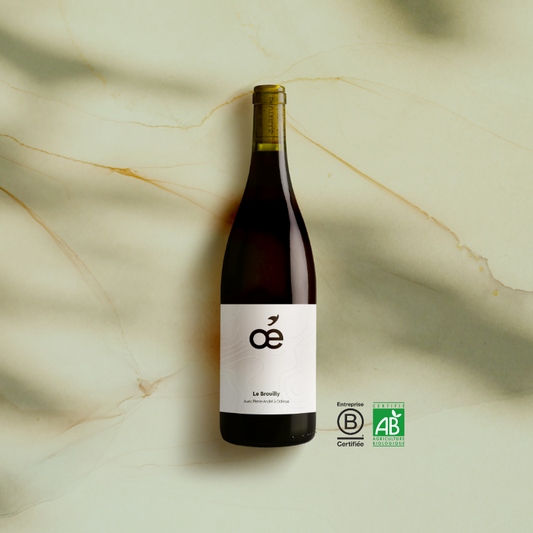Are you wondering why drink organic and natural wine? You've come to the right place, the Oé team gives you 4 good reasons to take the plunge. Spoiler alert, the four reasons are related to the environment and everyone's health , including the health of our beautiful planet and especially TASTE !

Organic wines, biodynamic wines and natural wines: let's go back to the basics!
Before starting, for those who have just discovered the Oé adventure, let us remind you of what is an organic wine , a biodynamic wine and a natural wine .
In a few sentences, organic wines are wines produced according to precise specifications which govern the AB ( Organic Agriculture ) label. In these specifications, the use of chemical pesticides and chemical fertilizers is prohibited. The only natural inputs (what is added to the vine to protect it from diseases) are copper and sulfur - more commonly called sulphites - in low doses.
Biodynamic wines are wines produced in accordance with biodiversity and lunar cycles. It was the philosopher Steiner who established the foundations of biodynamics in 1924. Biodynamics consists of preventing diseases rather than treating infested plots of vines once they have been infected with preparations such as horn dung , herbal teas , essential oils distilled on the plots in accordance with the lunar cycles . This method makes it possible to produce better grapes , to keep the vines in good health and therefore to produce better wines .
Natural wines are produced like biodynamic wines. The real difference happens in the cellar . During the fermentation and winemaking process, there is almost no human intervention. It is the indigenous yeasts found on the skin of the grapes that will activate the fermentation process. No inputs and sulphites are added and the wine does not undergo fining – a method which consists of filtering the wine before bottling . This is why we find a little more deposits in natural wines than in conventional, organic or biodynamic wines.
There are labels to certify that the wines respect the specifications of organic , biodynamic and natural and healthy wines . In themselves, the labels just allow us to ensure a certain level of quality. Be careful, this does not mean that non-labeled wines are poorly produced!
Protecting the planet from chemical pesticides
At Oé, our mission is to promote sustainable viticulture and benevolent consumption . What is meant by sustainable viticulture ? Quite simply, encouraging and supporting winegrowers who want to work the land as well as possible so that in 10, 20 or even 50 years, our children can enjoy a planet that is still habitable. Conventional agriculture today uses a lot of inputs : the chemicals everyone talks about.
In organic farming , the specifications we mentioned above require a certain level of wine quality and above all certify that the vines have not been treated with chemicals that are harmful to humans and the planet.
Many personalities such as Cyril Dion , Camille Etienne and Hugo Clément , for example, are investing in getting the message across: ecology and biodiversity are the essential components of our future.
Tasting organic wine is also having fun without contributing to soil depletion. The winegrowers who make organic winemaking want to bring their land back to life by promoting biodiversity . And it is this terrestrial and underground biodiversity that will somehow strengthen the vine stock, which will have enough nutrients to grow and protect itself against external aggressions: climatic hazards, diseases and pests (insects and animals).
Take care of your health
A very important point about food in general is to know that the “fuel” that we ingest is good for our health. It is vegetables, fruits and cereals that will bring the right nutrients to our body so that we can be in good shape all day, so that we can be efficient at the office or able to run a few kilometers or perform a feat. sporty: Michael Jordan's jump, Messi's touch of the ball, Federer's topspin backhand, Hamilton's surgical behavior... In short, you get the idea!
For the vine it's the same, if we spray chemicals on its leaves and its stock (the foot of the vine), it will help it to get rid of diseases but will also kill the good nutrients of the earth. In the long term, the vine will be impoverished.
When a wine is produced conventionally, sulphites and many added inputs can have consequences on our health. An organic or biodynamic wine, compared to the same number of glasses tasted conventionally, will give fewer headaches .
The elders say it so well: “one glass (of organic wine) a day, keep the doctor away”.
Who has never heard their grandparents say that a glass of red wine a day was the miracle cure for a healthy life ? When produced with respect for nature, red wine contains polyphenols, excellent antioxidants that allow the skin to slow down cellular aging. And yes Jamy, drinking wine in moderation is good!
Taking care of the health of winegrowers
Have you ever thought of the conventional winegrowers on the front with their nozzle to spread pesticides and chemical fertilizers on their plots of land? Not only does it not make you want to, but to top it off, many winegrowers suffer from pathologies linked to the spreading of pesticides on their vines , such as cancers or respiratory problems. Not all that happy!
So every year, we are amazed to see that many estates practice sustainable farming to gradually achieve conversion to organic farming . If you think that organic and biodynamic viticulture only attracts small producers and that the wines are no exception, we let you take a look at the website of Château Grillet , Château Pontet-Canet or Domaine Zind -Humbrecht . It takes 3 years of organic practice to obtain the AB label . It's a long process because the earth has to get used to no longer having chemicals to produce. The winegrower compensates the products with plants that provide the nutrients necessary for the growth of the vines . The first years are often intense, but once the label has been obtained and good practices have been established, winegrowers no longer want to go back. It's an exciting adventure!
Rediscover the taste of the terroir
Many of you tell us that you like wines that reflect their terroir , with wine characteristics that are exacerbated thanks to the exposure of the vines, thanks to the sun which ripens the grapes, thanks to the type of soil (clay, chalk, gravel, etc) which makes up each plot… When a winegrower produces his wines organically , he does not modify the composition of the soil and works in such a way as to provide the right nutrients thanks to green manures , plants and hedges that he adds in strategic places… It is thanks to the whole ecosystem that the winegrower puts in place that the wine is good and reflects its terroir.
The taste of a wine is also representative of its appellation. Each appellation lays down rules that winegrowers must rigorously follow in order to give it its name. For example, the AOC Côtes-du-Rhône must respect a yield of 5000 liters of wine per hectare . These restrictions may seem restrictive, but they are what guarantee the quality of the wine. And yes, as the quantities are regulated, the pruning of the vines , which is generally done in March, makes it possible to keep a maximum number of buds and therefore, the sap of the vines provides enough nutrients for a superior quality grape . Red wines in Côtes-du-Rhône can produce around 6666 bottles per hectare of vines to obtain the right to bottle under the appellation.
Better tasting wines, for our health and that of the planet, that may be the key to happiness. With a pinch of biodiversity and friends and voila!





